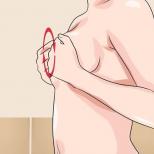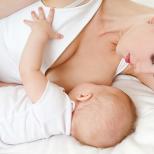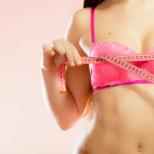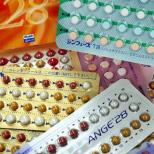Why do breast nipples hurt during the menstrual cycle?
Women experience breast pain, and nipple pain in particular, every month. In most cases, this is a manifestation of healthy physiological processes of the “life” of the reproductive system. For some, nipples hurt in the middle of the cycle, for others it happens just before menstruation, for others it is a signal of pregnancy. However, sore nipples can also signal the onset of pathological processes in the body. How to distinguish these manifestations? What you need to know about the norm and diseases?
Individual sensations of pain, heaviness, hypersensitivity of the breast, engorgement of the nipples are called mastodynia (or mastalgia). This is not a diagnosis, but denotes a certain condition, which may be normal or may be a manifestation of the disease.
There are many reasons for the occurrence of mastodynia. This:
- Hormonal changes associated with the natural rhythm of a woman’s life
- Hormonal surges with growing up, pregnancy or aging
- Manifestation of cancer of the breast or reproductive organs
- Hormonal shocks during abortion, miscarriage or surgical removal of reproductive organs during fertile age
- Breast surgery, including plastic surgery
- Diseases of the hormonal system
- Chronic diseases of the liver, kidneys
- Treatment with hormonal drugs
- Taking oral contraceptives
- Psychosomatic illnesses, neuroses
Physiological mastodynia is one that occurs for natural reasons in a healthy body. These are hormonal changes during one menstrual cycle, during pregnancy, menopause or during the period of a teenager’s period.
The female breast is part of the reproductive system and is sensitive to the slightest changes in it. Every month, according to an individual schedule, the mammary glands “prepare” for a possible pregnancy. They swell, become heavier, and their sensitivity increases significantly. Before menstruation, the nipples harden, darken, and sometimes discharge appears from them.
Experienced women are well aware of such sensations and additionally navigate them in relation to menstruation. Nipple pain in the second phase of the cycle is usually normal. The degree to which this norm manifests itself depends on the body of each individual woman.
Attention! The main reference point for the physiological norm of breast hypersensitivity is its frequency and coincidence with the monthly cycle. If pain occurs chaotically, this is a reason to immediately visit a gynecologist or mammologist.
Pain before menstruation
The main complaints about pain in the nipples occur a week before menstruation (approximately 20 days of the cycle). At this time, most women experience cyclic mastodynia. The mammary glands “fill up” and touching them becomes painful. Discharge from the nipples immediately before menstruation is typical. This is especially noticeable in the evening when a woman takes off her bra. The nipples and the area around the nipple are very itchy, and a feeling of stagnation is tormented.
The heaviness of the breasts and hypersensitivity of the nipples gradually disappear on the second or third day from the start of menstruation, as the uterus cleanses. In the next cycle everything repeats. The sensations may vary in strength, but maintain a constant rhythm.
Mid-cycle pain
Another normal option is sore nipples during ovulation. This condition is associated with a sharp increase in estrogen levels in the body. If the cycle is 28 days, then the hormonal surge occurs at the end of the second week. The release of the egg is a kind of “signal” for “preparing” the breast. Blood flow increases, the chest becomes heavier, and reacts painfully to touch. The presence of these symptoms during ovulation (as well as their absence) is considered normal.
Attention! If you can get rid of abdominal pain during menstruation with the help of medications, then there are no special medications for pain in the nipples. We just have to wait for everything to go away on its own.
Pain after menstruation
Healthy breasts return to their normal state even before the end of menstruation. If your nipples hurt immediately after your period, then there are several options:
- Pregnancy occurred, and what was mistaken for menstruation was slight physiological bleeding
- There is a hormonal imbalance in the body
- The disease develops
If nipple soreness does not go away after menstruation, then the first thing to do in this situation is to buy a pregnancy test. If the result is negative, you will have to undergo a comprehensive examination. You can conduct a preliminary inspection yourself.
Breast self-examination
Self-examination of the mammary glands is something every woman should be able to do. The inspection is carried out in several stages:
- You should start by inspecting the linen. It is necessary to make sure that there is no (or presence) discharge from the nipples. You should be especially wary of colored discharge - bloody or purulent.
- Visual inspection. You should stand facing the mirror without underwear, put your hands behind your head. The size, symmetry, and configuration of the breast are noted. Special attention to the color of the nipple area
- Palpation of the mammary glands. It is carried out in a circular manner, alternately, in a standing position and lying on your back. The affected area is examined several times
A healthy breast does not have lumps, painful areas, swelling, or “dropping” areas. Its color is even and does not differ from the body. Any change in the condition of the mammary glands should cause alarm, which only a specialist can dispel.
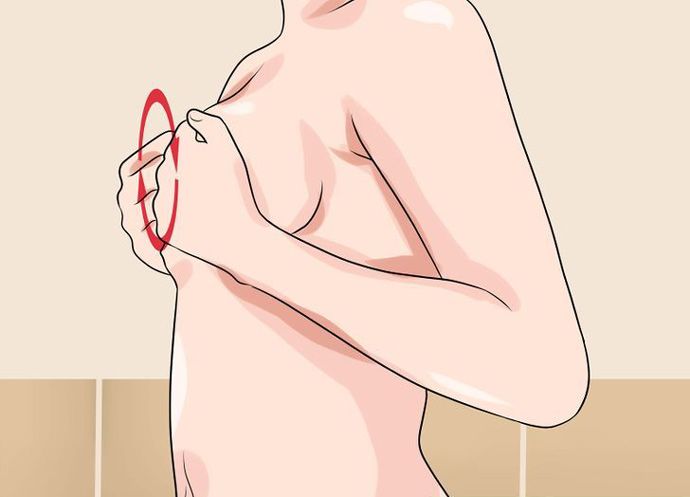
Pain when delayed
A delay in menstruation can be caused by completely harmless physiological reasons. In this case, a woman may experience discomfort in her nipples a little longer than usual. This happens when:
- There was a move with a change in climate or time zone
- A critical situation has arisen that requires increased nervous or physical stress
- A woman has undergone (or is in the process of) illness, surgery
- Takes hormonal (including contraceptives) or other potent medications
- There was a sudden weight loss
- Lack of body weight reaches critical levels
In all of these cases, the test is negative, but there is no menstruation. There is a delay of up to two weeks. However, menstruation, although not on time, comes.
Breast tenderness that does not end with menstruation almost always indicates pregnancy. Women who are preparing to become mothers for the first time note a greater intensity of sensations in the chest. Symptoms include:
- Darkening, sometimes significant, of the nipple and areola
- Their increase in size and density
- Manifestation of veins on the mammary glands
- Itchy nipple skin
- Breasts may increase significantly
- No pain in the lower abdomen
When nipples hurt and there is a delay, the first action should be to perform a test. A visit to the gynecologist will be necessary regardless of its results. If you are pregnant, then register. If the test is negative, then be examined for possible pathologies. Unfortunately, the list of diseases whose symptom is chest pain is very long.
Pathological breast tenderness
Discomfort in the mammary glands is characteristic of both “independent” breast pathologies and a number of diseases of the reproductive system. Sometimes this symptom has nothing to do with fertility. Why does nipple or breast discomfort occur?
Mastopathy
One of the main causes of breast pain “before, during and after” menstruation is fibrocystic mastopathy. This benign disease is characterized by a slow progression that can take years. Connective tissue gradually grows in the mammary gland, forming internal seals and irregularities. The danger lies in its possible degeneration into oncopathology.
In the initial stage of mastopathy, breast pain is similar to symptoms of PMS and goes away by the middle of menstruation. As the disease progresses, the symptoms increase in duration to permanent ones, with some change in intensity. Mastopathy can be detected through self-examination. It is finally confirmed by instrumental studies - ultrasound and mammography.
Dermatological causes
Sometimes sore nipples are explained not by internal diseases of the reproductive system, but by skin pathologies. It can be:
- Eczema. Affects the nipple and surrounding tissue. Characterized by rashes, itching, burning, weeping areas or crusts
- Psoriasis. The areola is affected. For a long time it does not cause much concern due to moderate pain. Characterized by the appearance of red spots of irregular shape, which may not be immediately noticeable on pigmented skin
- Impetigo. A bacterial infection that develops when the nipple is injured. Characterized by the appearance of small pustules. Caused by staphylococcus or streptococcus. Is fraught with complications and requires immediate treatment
- Herpes. Herpes rashes in the nipple area provoke itching and pain. Rashes on the chest of a pregnant or lactating woman are especially dangerous.
- Candidiasis. Fungal infection of the nipple and surrounding area. Accompanied by vaginal infection, damage to the digestive tract
At the slightest suspicion of dermatological pathology, you should immediately contact a specialist, since most skin diseases are contagious.
Remember that it is better to visit the doctor several times “in vain” than to get sick and not detect it in time.
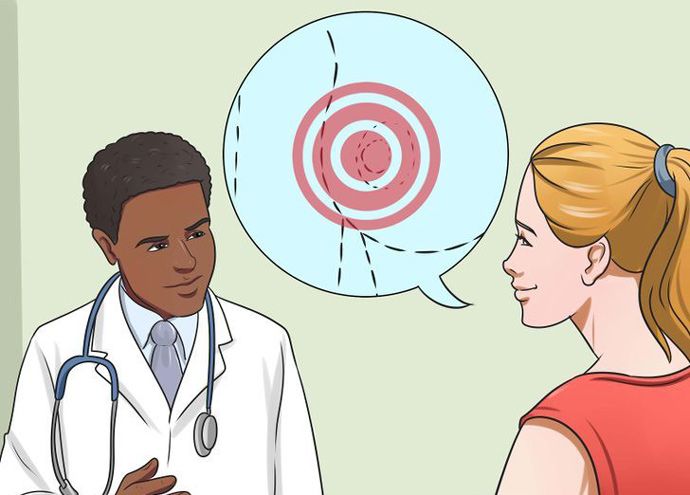
Due to the specific nature of painful sensations in the chest, they cannot be eliminated with medication. During such periods, natural underwear made from soft fabrics is used. It is advisable to wear a supportive bra, avoiding pressure on the nipple.
To prevent nipple hypersensitivity, it is “hardened”, which consists of regular:
- Washing your breasts with cool water
- Massage the nipple and surrounding area with your fingers and soft cloth
- Nipple massage with pulling
- Wiping with a rough towel
The meaning of such actions is to artificially roughen the skin of the nipple and the area around the nipple. Gradually, the nipples hurt less than the breasts, as their sensitivity is lost. In the future, this will prevent them from cracking when feeding the baby.
1 ratings, average: 5,00 out of 5)


